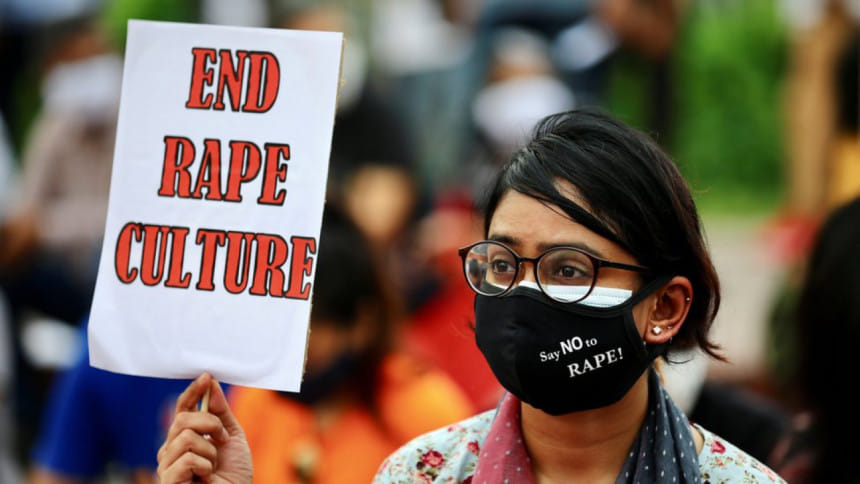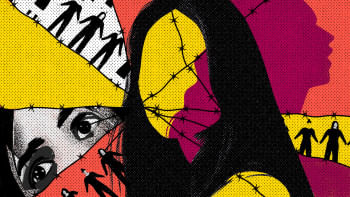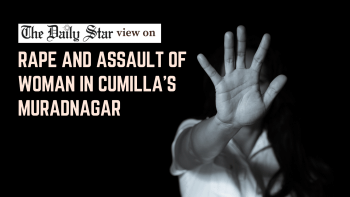Justice for rape victims requires an empathetic system

It'll never get easier to say this, but rape incidents in Bangladesh, like the one in Muradnagar, are episodes of a recurring nightmare that we just can't seem to wake up from.
From the gang rape of a 40-year-old mother of four, while her husband and children were tied up in Subarnachar, Noakhali, on the night of the 2018 general election, to the immolation of Nusrat Jahan in 2019, set ablaze for reporting sexual harassment by her madrasa principal in Sonagazi, Feni, and, most recently, the rape and murder of an eight-year-old girl by her sister's father-in-law in Magura—the accounts of these heinous crimes are distressing, often more so than public reports can fully convey.
Following the Muradnagar incident, arrests have been made and statements with pledges for support and assurances of swift justice have been issued.
But we have watched this pattern unfold too many times, so often that it's hard to believe that justice for rape ever comes swiftly.
A look at cases filed over violence against women in recent years shows a grim trend: a substantial number remain suspended in limbo, unresolved and on the verge of being lost within the court documents forever. Over 35,000 cases filed under the Women and Children Repression Prevention Act remain pending with courts across the country for more than five years, according to a Supreme Court report. However, the law has a provision mandating the court to dispose of such cases within 180 days from the start of proceedings.
In most cases, arrests are made, but a key reason behind the delay is that prosecution witnesses do not appear before the court to testify.
One could argue that there is a sense of fear associated with testifying in these cases due to the lack of safety afforded to witnesses, particularly after proceedings have begun, discouraging voices that might otherwise speak up.
This is just one of several causes that delay trials, with others including limited forensic infrastructure, faulty or incomplete investigations, and overwhelming caseloads against severe judge shortages and other logistical shortcomings.
These procedural delays, in turn, pave the way for suspects to secure bail, further deepening the victims' feelings of helplessness and reinforcing a culture of impunity.
In a system that shields the guilty and renders the wounded powerless, justice can be nothing more than a distant reality.
A true justice system
Ideally, justice for rape should begin with building a system that believes, protects, and empowers survivors.
The process should begin with an emergency response that includes medical care, psychological counselling, and reporting mechanisms that prioritise survivors. Rape crisis centres should operate round the clock, offering all services essential to survivors under one roof. These centres should be staffed by professionals trained in both sensitivity and confidentiality.
Then there's the crucial part of forensic evidence. It needs to be collected quickly with the help of clear guidelines and trained female medical professionals. And when it comes to DNA analysis, it should be fast-tracked through a network of well-equipped labs. Police should conduct investigations under a strict protocol and a legally mandated timeline. Survivors and witnesses must be protected from intimidation so that they can testify without fear.
As for trials, they should be sent to modernised courts with as little delay as possible. Judges and prosecutors should receive training to eliminate bias and victim-blaming in the courtroom. And at every single step, the survivor's privacy needs to be protected. There should also be reparative measures available like compensation, long-term support, and even safe housing facilities if needed.
Beyond the legal process, comprehensive sex education in schools and media campaigns to destigmatise survivors would be a step in the right direction.
Finally, accountability must extend beyond the courtroom. We need public oversight, parliamentary monitoring, and transparent reporting of conviction rates. This helps track the progress of the justice system.
Ultimately, true justice isn't just about punishing the guilty. It's about restoring dignity and ensuring safety of the victims, and transforming the culture that allowed the violence to happen in the first place. That's the kind of justice rape survivors deserve, and it's the kind of justice we, as a society, must demand.
Subrata Roy is sub-editor at the news desk at The Daily Star. He can be reached at [email protected].
Views expressed in this article are the author's own.
Follow The Daily Star Opinion on Facebook for the latest opinions, commentaries and analyses by experts and professionals. To contribute your article or letter to The Daily Star Opinion, see our guidelines for submission.

 For all latest news, follow The Daily Star's Google News channel.
For all latest news, follow The Daily Star's Google News channel. 










Comments